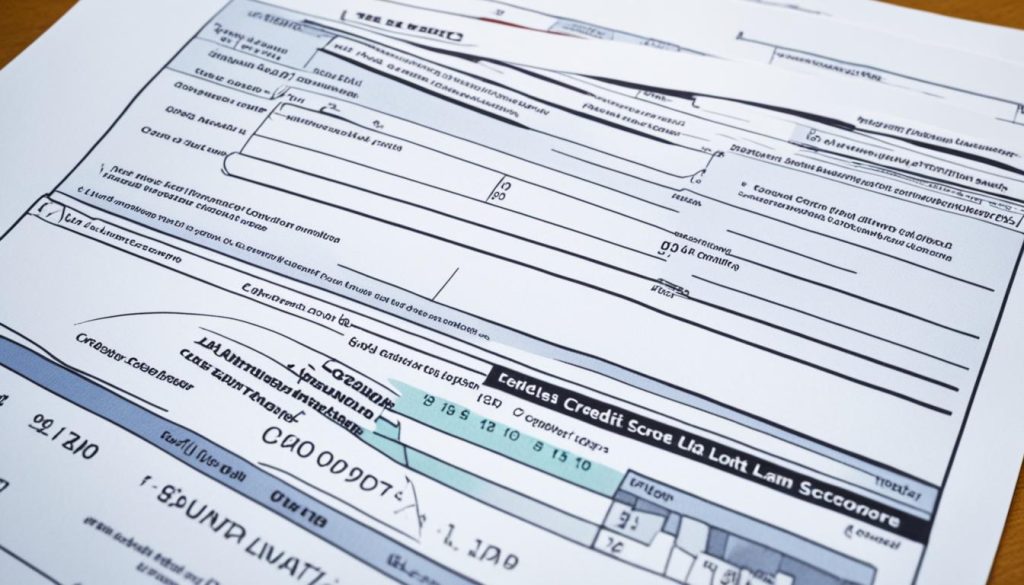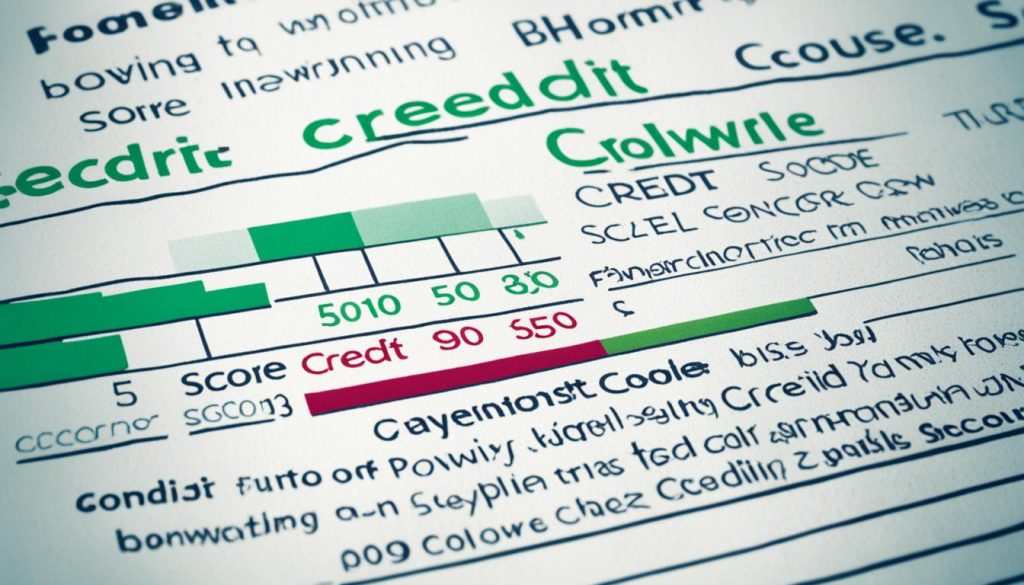When it comes to exploring financial opportunities and loan options, understanding the minimum credit score requirements is paramount. Earnest, a trusted lender preferred by over 890 universities nationwide, has a minimum credit score requirement of 650. This means that individuals with credit scores as low as 650 can still qualify for Earnest loans, opening doors to various financial opportunities. It’s important to note that meeting the minimum credit score requirement is not the only factor considered in the loan approval process. Having a co-signer, a stable work history, and a higher income can increase the chances of loan approval and secure lower interest rates. The fixed interest rates offered by Earnest start as low as 4.11% for co-signed loans and 5.42% for independent borrowers. Meeting the minimum credit score requirement for Earnest loans provides borrowers with access to flexibility, low rates, and the security provided by a reputable lender.
Key Takeaways:
- Earnest has a minimum credit score requirement of 650.
- Meeting the minimum credit score requirement is not the sole factor for loan approval.
- Having a co-signer, stable work history, and higher income can increase loan approval chances and secure lower interest rates.
- Earnest offers fixed interest rates starting as low as 4.11% for co-signed loans and 5.42% for independent borrowers.
- Meeting the minimum credit score requirement provides borrowers with flexibility, low rates, and the security of a reputable lender.
Factors Influencing Credit Score Eligibility for Earnest Loans
Various factors influence credit score eligibility for Earnest loans. In addition to the minimum credit score requirement, Earnest takes into account several key aspects of the borrower’s financial profile.
Income
The borrower’s income plays a crucial role in determining credit score eligibility. Having a higher income not only improves eligibility but also increases the chances of loan approval. Lenders consider a higher income as a reflection of financial stability and the ability to manage loan repayments.
Savings
The borrower’s savings are also considered by Earnest when evaluating credit score eligibility. A healthy savings account indicates financial responsibility and the ability to handle unexpected expenses or financial emergencies. Maintaining a sizeable savings demonstrates solid financial management skills.
Work History
Earnest evaluates the borrower’s work history as part of the eligibility assessment. A stable employment history indicates financial stability and reliability, which can positively impact creditworthiness. Demonstrating consistent employment and a strong work ethic provides lenders with confidence in the borrower’s ability to repay the loan.
Education Level
The borrower’s education level is taken into account by Earnest as well. Possessing a higher education level, such as an associate’s degree or higher, shows a commitment to personal and professional growth. This commitment can positively influence creditworthiness and increase credit score eligibility for Earnest loans.
Payment History
Maintaining a consistent pattern of making payments on time is crucial in determining credit score eligibility. Demonstrating a reliable payment history exhibits responsible financial behavior and increases the borrower’s creditworthiness. Lenders consider prompt payment as an indicator of the borrower’s ability to manage loan obligations.
Non-Student Debt
Managing non-student and non-mortgage debt is another factor considered in determining creditworthiness. Keeping non-student debt levels low and avoiding unnecessary debt can positively impact credit score eligibility for Earnest loans. Lenders view borrowers with lower levels of debt as less of a financial risk.
By considering these various factors, Earnest ensures a comprehensive evaluation of credit score eligibility, providing borrowers with access to loan options that align with their financial profile.
Qualifying for Earnest Loans Based on Credit Score
Meeting the minimum credit score requirement is the first step to qualify for an Earnest loan. Earnest requires a minimum credit score of 650. However, credit score is not the only factor considered during the loan application process. To qualify for Earnest loans, borrowers must also meet other eligibility requirements.
These eligibility requirements include:
- U.S. citizenship or permanent residency
- Income verification
- Holding an associate’s degree or higher
Alternatively, borrowers who are currently enrolled less than half-time can also qualify if they have student loans in repayment.
Earnest takes a holistic approach in evaluating loan applications, considering factors beyond just the credit score. By taking into account various aspects of the borrower’s financial situation, Earnest aims to provide loan opportunities to individuals who may have lower credit scores but meet other criteria.
Providing all the necessary documentation and information during the loan application process increases the chances of loan approval.

Improving Credit Score to Meet Earnest’s Minimum Requirements
If your credit score falls below the minimum requirement of 650 for an Earnest loan, there are several steps you can take to improve it and increase your chances of loan approval. Implementing these strategies will demonstrate responsible financial behavior and help you meet Earnest’s credit score requirements.
First and foremost, making consistent and on-time payments on your existing debts, such as credit cards and other loans, is crucial. This showcases your ability to manage financial obligations and builds trust with lenders. By consistently making payments, you can establish a positive payment history that reflects well on your credit score.
An effective credit improvement strategy is to pay down balances and reduce your overall debt. Doing so will lower your debt-to-income ratio, reducing the perception of financial risk and potentially boosting your creditworthiness in the eyes of lenders.
Another important factor to consider is keeping your credit utilization low. This means utilizing only a small portion of your available credit. By demonstrating responsible borrowing behavior and keeping your credit utilization ratio low, you can positively impact your credit score.
Avoiding the temptation to open new lines of credit unnecessarily is key. Opening multiple accounts within a short period can have a negative impact on your credit score. Instead, focus on managing and improving your existing credit accounts.
Regularly monitoring your credit reports for errors or discrepancies is essential for maintaining an accurate credit score. Mistakes on credit reports can disproportionately impact your score and hinder your ability to meet Earnest’s minimum credit score requirements. By checking your credit reports regularly and disputing any inaccuracies, you can ensure that your credit score is based on correct information.
Expert Tip:
Remember, improving your credit score takes time and effort. Be patient and consistent in your efforts to meet Earnest’s minimum credit score requirements. With dedication and responsible financial habits, you can enhance your creditworthiness and open doors to better loan opportunities.
By following these strategies and taking proactive steps to improve your credit score, you can increase your chances of qualifying for an Earnest loan and accessing the financial opportunities you desire.

Understanding Credit Score Thresholds for Earnest Loans
While the minimum credit score requirement for Earnest loans is 650, aiming for a higher credit score can offer additional benefits. Borrowers with higher credit scores not only increase their chances of loan approval but also have the opportunity to qualify for lower interest rates.
By positioning themselves above the minimum credit score requirement, borrowers open up better financial opportunities. A higher credit score demonstrates creditworthiness and responsibility, factors that lenders consider when evaluating loan applications.
“A higher credit score not only improves your chances of loan approval but also puts you in a better position to negotiate lower interest rates, which can result in significant savings over the life of the loan,” says financial expert Jane Smith.
Having a higher credit score provides borrowers with more than just loan approval; it enhances their borrowing power. With a higher credit score, borrowers gain the flexibility to access more favorable loan terms, such as higher loan amounts or longer repayment periods.

“Understanding credit score thresholds for Earnest loans empowers borrowers to take control of their financial future,” says credit specialist Sarah Johnson. “Aiming for a credit score above the minimum requirement opens up a world of possibilities and helps individuals achieve their financial goals.”
- Borrowers with higher credit scores can qualify for lower interest rates
- Higher credit scores increase the chances of loan approval
- A higher credit score enhances borrowing power and offers more loan options
- Understanding credit score thresholds is crucial for borrowers aiming for financial success
By focusing on improving their credit scores, borrowers can not only meet the minimum requirements but also unlock access to better loan terms and ultimately achieve their financial dreams.
Eligibility Guide & Requirements for Earnest Products
Earnest offers a range of loan products, each with its own specific eligibility requirements. Whether you’re considering student loan refinancing, personal loans, or parent PLUS refinancing, understanding the eligibility factors is crucial.
Student Loan Refinancing Eligibility
To qualify for student loan refinancing with Earnest, you must:
- Be a U.S. citizen, possess a Permanent Resident Card, or have Deferred Action for Childhood Arrivals (DACA) status.
- Have graduated from a U.S.-based Title IV-accredited college or university.
- Meet the credit score requirements, income criteria, and other financial factors considered in the eligibility evaluation.
Parent PLUS refinancing and cosigned student loans have similar requirements, including income, credit history, savings, and debt-to-income ratio.
Personal Loan Eligibility
If you’re considering a personal loan with Earnest, you must:
- Be a U.S. citizen or possess a Permanent Resident Card.
- Meet specific income and credit score requirements.
Meeting these criteria will help determine your eligibility for Earnest’s personal loan options.
Understanding these eligibility criteria is crucial for individuals considering Earnest’s loan products. It enables you to assess your eligibility and determine whether you meet the necessary requirements to proceed with your loan application.

Conclusion
Meeting the minimum credit score requirement is just the first step towards qualifying for an Earnest loan. While the credit score requirements are important, there are other factors that play a role in determining eligibility, such as income, education level, and payment history. It’s crucial for borrowers to focus on improving their creditworthiness to increase their chances of loan approval and secure lower interest rates.
Improving creditworthiness involves making consistent payments, paying down debt, and maintaining a low credit utilization. By demonstrating responsible financial behavior and managing debt effectively, borrowers can enhance their credit scores and increase their attractiveness to lenders.
By understanding and meeting the credit score requirements, borrowers can confidently apply for Earnest loans and unlock a world of financial opportunities. Whether it’s financing their education, consolidating existing debt, or pursuing other financial goals, Earnest provides individuals with the flexibility and security they need to achieve their dreams.



No comments! Be the first commenter?